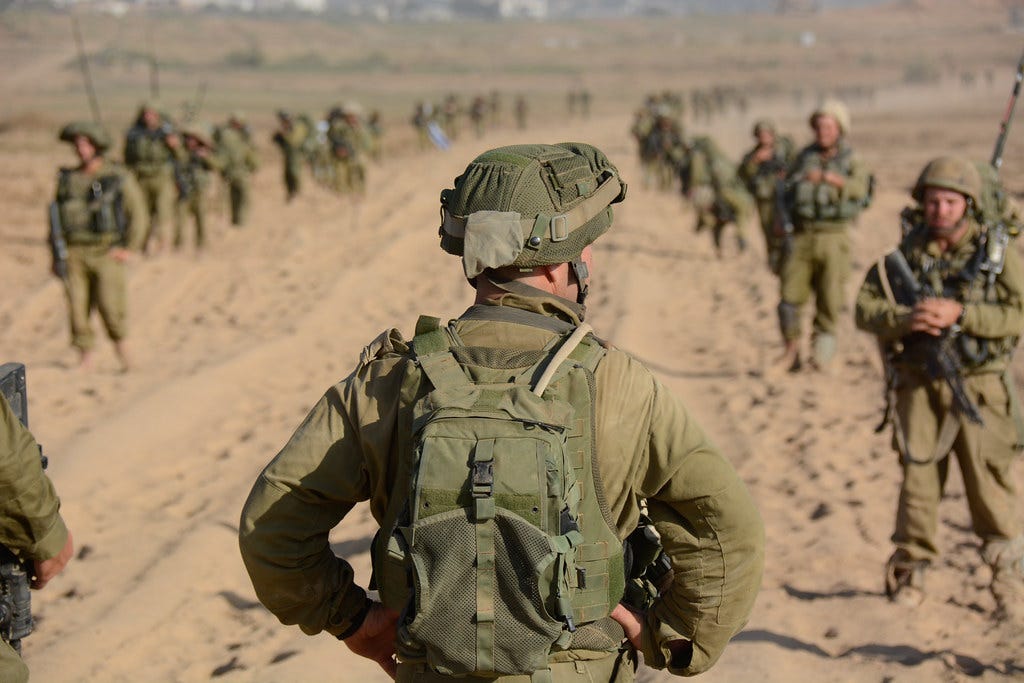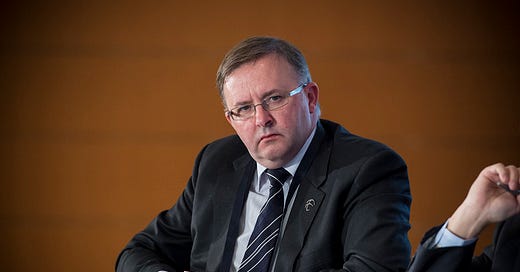'Aligned' NZ leaders just as vulnerable to genocide-enabling charges as Albanese
Luxon, Peters and Hipkins, like their Australian counterparts, repeated Israel's right to defend itself justifications for the Gaza bombing campaign.

New Zealand’s political leaders may be vulnerable to the same genocide-complicity charges presented to the International Criminal Court (ICC) against Australian Prime Minister Anthony Albanese.
On Tuesday, March 5 a communique was handed over to the Office of the Prosecutor (OTP) outlining evidence and arguing Albanese and other politicians effectively gave diplomatic cover for and material support to Israel’s genocidal onslaught in Gaza over the past five months.
It requested an investigation be launched by the OTP, headed up by Karim Khan, who will now assess the content of the 92-page document.
Put together by Australian firm Birchgrove Legal and endorsed by over 100 lawyers and barristers, the communique sees Albanese become the first Western leader accused of being an accessory to genocide in Gaza under article 15 of the Rome statute. It argues these individuals effectively gave diplomatic cover for and material support to Israel’s actions.
The move by those in Australian civil society highlights the dangers of aligning New Zealand foreign policy settings with Australia, which is now considered the US’ chief ally in Asia-Pacific.
“In my view, the communique submitted to the ICC by Brichgrove Legal regarding Australia’s leaders potential accessorial liability under the Rome Statute effectively put Prime Minsiter Luxon and Deputy Prime Minister Peters, among other New Zealand leaders, on notice,” senior law lecturer at University of Auckland, Dylan Afaso told In Context.
In recently months, both New Zealand and Australia have joined statements for a ceasefire and like the US have expressed of concerns over Israel’s actions. However, Afaso says such statements do not keep leaders safe from charges of complicity in genocide, as the International Court of Justice (ICJ) assesses evidence against Israel.
“Mere joint statements, let alone ones that are arguably very weak by careful design, simply cannot negate the material impacts of these leader’s actions and inactions that are already well documented and evidenced and can be further investigated by the ICC and scrutinised by the ICJ also,” he said.
Albanese told media the communique had no credibility and refused to comment further.
The document, presented to the ICC on Monday, March 4, focuses on two types of “accessorial liability” it says applies to Albanese, Foreign Minister Penny Wong and leader of the opposition Peter Dutton.
In a statement on March 5, Kings Counsel Sheryn Omeri, said: “In relation to accessorial liability, a person may be criminally responsible for a crime set out in the Roman statute if, for the purpose of facilitating the commission of that crime, that person aids, abets or otherwise assists in the commission of that crime, or its attempted commission, including by providing the means of that commission.
“Secondly, if that person in any other way contributes to the commission of the crime, attempted commission by a group, knowing that this group intends to commit the crime.”
The communique argues by repeatedly claiming Israel had a right to defend itself as it bombed Gaza, the politicians effectively offered the Zionist regime diplomatic cover.
It also noted the government had green-lighted shipments of military hardware to Israel, particularly parts of the F-35 stealth bomber, which could be used during the commission of what the International Court of Justice (ICJ) had previously determined was a prima facie case of genocide.
On January 27 (NZT) the ICJ issued six interim orders, including taking measures to prevent acts of genocide and punishing those who incited it, following an 84-page writ by South Africa, filed on December 29, 2023.
The ICC communique further argues that Australia’s decision to suspend its $6 million funding for the aid body UNRWA, which gives vital support to 5.9 million Palestinian refugees, was in violation of the ICJ order in January to cease harming of Palestinians in Gaza.
UNRWA funding cut amid forced starvation
Accusations by Israel against staff members of involvement in Hamas’ October 7 attack was followed by 10 countries, including the US, Australia and Germany, stopping donations to UNRWA.
Israel’s claims were unsubstantiated, based on alleged statements made by Hamas members under interrogation by the Israeli military, which has a history of torturing detainees.
It noted Israel’s long effort to destroy UNRWA, its institutional presence a reminder of Palestinians’ right to return to land it occupies.
Israel has blocked aid, including food, water, fuel and medical supplies into Gaza as the population faces famine. There are increasing reports of deaths in Gaza by starvation, including 17 children on March 3.
In a proposal for a 40-day truce in February, Israel offered to allow 500 trucks of humanitarian aid into Gaza daily. As Lebanese scholar and political analyst Amal Saad remarked, “by deliberately starving the Palestinian people, with the help of its own citizens who are actively blocking food and aid from reaching Gazans, Israel was able to create new facts on the ground”.
“This helped it raise its bargaining ceiling to merely slowing down starvation, which it can now claim as a major ‘concession’.”
The ICC communique said suspension of funding to UNWRA, Gaza’s primary source of aid, was a form of collective punishment that may implicate Australia in genocide.
It noted: “The timing of the accusations against the agency suggests a malevolent motive to circumvent the application of the ICJ provisional measures in the case of South Africa vs Israel.”
New Zealand leaders ‘aligned’ with Australia
It could also be argued New Zealand’s leaders, including Prime Minister Christopher Luxon, Foreign Minister Winston Peters and Labour leader Chris Hipkins when he was prime minister and acting prime minister, have also offered rhetorical support for Israel’s intention to commit a genocide.

They have repeated US-vassal speak about Israel’s right to defend itself multiple times, seen as a public declaration of moral support for Israeli actions.
Hipkins on October 9 told media he had been in contact with Albanese about the unfolding situation in Gaza after the Hamas attack and said he believed the New Zealand and the Australian positions were "very aligned".
Weeks later at a media conference, Hipkins repeated his support for Israel’s right to defend itself and claimed he was not aware of Israel committing any war crimes, even after thousands of civilians had been killed, hospitals attacked and a total siege of Gaza put into effect.
The National-led coalition government has continued with this trans-Tasman foreign-policy alignment. It has also suspended $1m funding of UNRWA until an investigation into Israel’s claims takes place and has refused to support South Africa’s ICJ application.
Withholding these funds risks violating article 2(c) of the Genocide Convention by “deliberately inflicting on the group conditions of life calculated to bring about its physical destruction in whole or in part”.
On January 23 the government announced six New Zealand military personnel had been sent to help a US-led military coalition target Houthi forces in Yemen over its Red Sea naval blockade of ships it believes are associated with Israel’s genocidal onslaught. The coalition under US Central Command has since bombed the country over 120 times over Houthi attacks on commercial shipping vessels.
Australia has also sent army personnel to the region, although their role remains hidden. There have been reports it is giving Israel intelligence data from a spy base in Pine Gap, southwest of Alice Springs. The New Zealand government and security agencies have refused to disclose whether similar intelligence is being supplied.
‘We're on the wrong side of history’
Director of the Centre of Peace & Conflict Studies at University of Otago, Professor Richard Jackson, said it was clear New Zealand was continuing to fail to meet its obligations to prevent genocide.
“I think a lot of international lawyers are quite clear about New Zealand's obligations under the Genocide Convention - that we need to be doing a lot more. We need to be taking concrete steps rather than just repeating platitudes and what we've done to date doesn't really comply with the obligations of the Genocide convention,” Jackson said.
He has called for an academic boycott and sanctions similar to those advocated in a motion passed unanimously in the Irish Senate last month.
“We're on the wrong side of history in so many different ways. Apart from the obvious moral reckoning that will happen in the future when we look back on them on this, the fact that we sided with the small number of mostly white, Western powers in an obvious case of genocide and even sent troops over to the Middle East to fight with them.”
He said the US-backed genocide in Gaza was destroying any notion of a “rules-based international order” the collective West had been purporting to uphold and New Zealand’s leaders were also acting against the country’s own interests.
“They seem to be burning down any pretence of a liberal order,” he said. “New Zealand, as a small state, relies on a stable, ordered international environment and it goes against our pragmatic interests in that sense to be supporting its breakdown.
“New Zealand is betraying its traditional commitment to a principled foreign policy. It took a principled stand against apartheid and recognised it for what it was. It took a principled stand against the immorality and illegality of nuclear weapons.
“It’s taken various other principled stances before and yet on this case, as a great many countries have done, it seems to have decided that the pragmatics of geopolitics trumps its principles and its commitment to international law, being a good international citizen.”
New Zealand and others more cautious
Jackson was one of a number of human rights scholars and legal experts who signed an open letter to the government in February, urging the government to be fully compliant with its international law obligations in light of the ICJ ruling.
Asafo was another signatory. He New Zealand had failed to call out Israel’s flagrant disregard for the ICJ’s orders, but there were signs it, like other Western nations, was becoming more concerned about its legal responsibilities.
Last month New Zealand released a joint statement with Canada and Australia as Israel stepped up its attacks on Rafah, a Gazan city on Egypt’s border. It called for a sustainable humanitarian ceasefire and warned a ground offensive in Rafah would have disastrous consequences for the 1.5 Palestinians corralled into the city amid fears they face being forced into the Sinai desert. Egypt is currently constructing a wall and holding facility outside Rafah.
Asafo said Western powers were now more aware that such attacks could no longer be justified or successfully explained away by reference to erroneous claims to Israel’s right to self-defence, claims rubbished by UN Special Rapporteur Francesca Albanese as having no basis in international law.
“With Israel's attacks on Rafah as the last refuge for over 1 million displaced Palestinians, it has made its intentions to commit genocide in violation of and disregard the ICJ’s binding orders clearer than ever to the point that even New Zealand, Canada and Australia could not ignore,” he said.
“That said, the joint statement itself should be understood as an attempt to mitigate their legal liability under the Genocide Convention and the immense reputational and political damage their respective governments have incurred and are incurring so far - not as an expression of a genuine commitment to preventing further genocidal violence by Israel in Rafah and Palestine more broadly.
“This is not only clearly evident in the ways in which the statement fails to hold Israel accountable for its actions in Rafah, but also in how it communicates the three states’ intentions to maintain friendly relations with Israel.”
He said, while the statement briefly referred to the ICJ’s ruling and orders as being “clear” and “binding”, it made no mention of the fact that Israel has flagrantly disregarded the ICJ’s orders.
“To put it plainly, there is nothing in that joint statement that would make, and has made, Israel seriously reconsider its actions and comply with the ICJ's orders. The statement is that way by careful design.
“In my view, to comply with their legal obligations under the Genocide Convention to prevent genocide and avoid being complicit in genocide, these states need to issue a joint strong condemnation of Israel’s actions in Rafah, with strong and clear accountability measures and consequences to ensure Israel ceases its operation in Rafah. These measures include sanctions and suspending diplomatic relations with Israel.”
New Zealand’s Ministry of Foreign Affairs and Trade (Mfat) rejected the criticisms, although a spokesperson refused to say whether its officials had received advice from Crown Law or any international bodies over its legal position on backing Israel’s right to defend itself by bombing Gaza, or over its suspension of UNRWA funding.
In a statement, she said New Zealand had “not paused funding to UNRWA”.
“The next tranche of UNRWA funding is due by mid-year, so we have time to consider information on the allegations, UNRWA’s response, and the subsequent investigation as it is made available. The Ministry will provide further advice to the Minister of Foreign Affairs as this comes available.”
However, the government did announce it would pause funding, regardless of semantics around timeframes. In announcing the funding suspension on January 30, Luxon had told media: “We won't be making any further contributions until the Foreign Minister says it is good to do so.”
The decision itself would have had an immediate and tangible effect. The government’s statement effectively signalled that it believed other nation’s decisions to cut UNRWA funding were based on legitimate concerns over Israel’s unsubstantiated allegations.
The Mfat spokeswoman said New Zealand was meeting its obligations under the Genocide Convention, “including by clearly and consistently stating its position publicly”.
“New Zealand has raised its concerns bilaterally with Israel, and in successive statements at the United Nations Security Council and General Assembly,” she said.
“Since the start of the conflict New Zealand has consistently called on all parties to comply with international law in national statements and in statements alongside Australia and Canada. New Zealand has been clear from the outset that the protection of civilians is paramount: the price of defeating Hamas cannot be the continued suffering of Palestinian civilians.
“New Zealand has called on all parties to comply with the binding decisions of the International Court of Justice, including the provisional measures issued on 26 January 2024, which order Israel to abide by its obligations under the Genocide Convention.”
IDF members ‘must be warned’

Both the open letter to the New Zealand government and the Australian communique to the ICC demanded action over citizens’ involvement with the Israeli Defence Force (IDF).
The open letter said IDF members must be warned their actions may contribute to genocidal acts and called on the government to prosecute New Zealand citizens for “any involvement in potential war crimes, crimes against humanity, genocide and torture, as well as any acts which potentially breach the ICJ’s binding orders”.
Mfat back in January told In Context it did not keep a record of New Zealand citizens or residents involved with IDF and suggested Israeli authorities should be approached for the information. That in itself suggests the government can access this information through diplomatic channels.
There is no evidence to suggest this has happened. In Context has been denied information via Official Information Act (OIA) requests regarding correspondence between Israeli officials and the government over the ICJ application, as well as other matters pertaining to Israel’s operation in Gaza.
“All state parties to the Genocide Convention, including New Zealand, have been put on notice about the duties they also have to prevent and punish genocide,” Afaso said.
“New Zealand government must acquire critical information, such as how many New Zealand citizens are currently serving in the IDF, and the means to contact these New Zealand citizen's in the IDF to inform them of the legal implications of their service and contributions to Israel's military operations in Gaza. If the New Zealand government does not have this information, it must work immediately to acquire this information in order for New Zealand to fulfil its legal obligations under the Genocide Convention."






I am not rich, I have no legal knowledge. But I am willing to do what I can to ensure that Hipkins, Peter's, Luxon, the boss of MFAT, as well as New Zealanders in the IDF all get their appointments at a war crimes trial . Keep up the great work z Mick
Did the Third Reich have a "right to exist"? Does the State of Israel? Does the Realm of New Zealand? The answer must be "No" in all three cases. No state has a right to exist. We suffer their existence just so long as they serve the interests of the people under their jurisdiction and they do no harm to outsiders. The State of Israel has failed spectacularly on the second count, and the colonialist entity of New Zealand on both counts. New Zealand's specious arguments with respect to its tacit support of genocide in Gaza can stand only because the regime enjoys the benefit of a compliant media which will not critically examine government statements and chooses not to report the relevant facts.